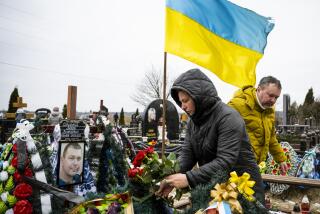NATO: No Backdown
- Share via
As NATO’s air war against Yugoslavia intensifies, doing ever greater economic damage but also taking a rising toll in civilian casualties, the pace of diplomatic efforts to resolve the conflict is being stepped up.
Some signs from Belgrade are beginning to indicate that public opinion is being prepared for a backdown from the unremitting defiance of NATO that President Slobodan Milosevic has so long expressed.
Diplomacy remains the preferred method for settling the Kosovo crisis, so long as the just objectives set by NATO are met. Among these are the return of expelled Kosovars to their homes under NATO-led international protection, restoration of the autonomy Kosovo once enjoyed and the withdrawal of nearly all Yugoslav soldiers and police from the province where they have produced such enormous upheaval and misery.
Russia, a traditional ally of the Serbs, has become Milosevic’s advocate in negotiations with the West. Former Prime Minister Viktor S. Chernomyrdin continues to meet with U.S. Deputy Secretary of State Strobe Talbott and various European leaders, and American officials believe they are detecting greater flexibility in Russia’s position. Significant differences in approach remain, however, especially over NATO’s demands for a dominant role in peacekeeping operations and the withdrawal of Serb forces from Kosovo. A possible target date for a settlement could be June 18, when the Group of Seven, joined by Russia, holds a summit meeting in Germany.
The 19 NATO countries continue to be largely of one mind on the need to press on with the air war, but there is no consensus on launching a possible ground campaign in Kosovo should bombing fail to break Milosevic’s will. Germany, with the largest army among NATO’s European members, has ruled out any participation in an invasion. Britain argues, correctly, that planning for such a contingency should at least begin, since a fresh humanitarian calamity looms if the hundreds of thousands of Kosovar expellees in Albania and Macedonia are not back in their homes before the onset of winter. That is the real deadline facing NATO.
Diplomacy is being given every chance now to resolve the conflict, and under the pressure of allied bombing it might succeed. Certainly we want diplomacy to succeed. But there can be no ambiguity about how success is measured. The fight NATO has been waging will be validated only when its core demands for Kosovo are accepted by Belgrade.
More to Read
Sign up for Essential California
The most important California stories and recommendations in your inbox every morning.
You may occasionally receive promotional content from the Los Angeles Times.













